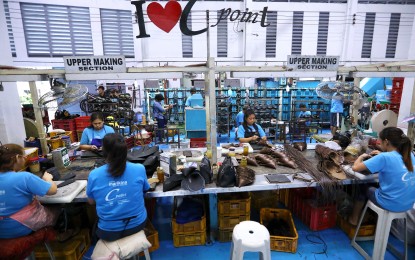
PAY HIKE. Employees produce handmade shoes in a shoe factory in Marikina City on May 11, 2023. Private Sector Advisory Council (PSAC) head for jobs and Go Negosyo founder Joey Concepcion on Wednesday (Feb. 21, 2024) said they would like a staggered implementation of the PHP100 wage hike. (PNA photo by Joey O. Razon)
MANILA – Private Sector Advisory Council (PSAC) head for jobs and Go Negosyo founder Joey Concepcion on Wednesday suggested the proposed PHP100 wage hike should be implemented on a staggered basis and not just in one go.
In an interview with Bagong Pilipinas Ngayon, Concepcion said the past administration has never imposed an immediate wage hike of as much as PHP100.
“I am not against wage increases... But do we implement 100 (pesos) in one go or we plan that overtime?” he asked, adding that only large companies will be able to afford the rate of the wage hike.
“Not everybody can afford a PHP100 wage increase, maybe large corporations, those that are doing well. But there are also [those] that are not doing well,” he added.
Asked about the implementation period for the staggered pay increase, Concepcion said he would leave this topic to the experts.
Although the micro-enterprises will be exempted from implementing the PHP100 pay hike, small and medium enterprises (SMEs), which comprise 99 percent of business establishments, will struggle to implement it, and may lead to close down their operation, the former presidential adviser for entrepreneurship said.
He added that some MSMEs have started to recover from the impacts of the pandemic and this kind of government policy should not break the momentum.
Concepcion noted that aside from wage hikes, Filipinos should also pursue improving their skills.
“I think we should remain focused on creating more jobs for our people. Hopefully, some of our people will start to upskill and reskill themselves because the more skills you have, you can move up the ladder and be promoted to a higher position which will give you higher pay,” he said.
Meanwhile, the Philippine Chamber of Commerce and Industry (PCCI) remained in opposition to the PHP100 pay increase.
In a statement Wednesday, the PCCI said Congress should defer the discussions on salary adjustments to the National Wages and Productivity and Regional Tripartite Wages and Productivity Boards.
PCCI president Enunina Mangio said the PHP100 wage hike will only benefit five million workers in the formal sector, leaving behind the 47 million Filipinos working in the informal sector.
“The PHP100 proposed wage (hike) will not even be enough when inflation goes up. Why don’t we instead legislate measures to address the rising cost in food prices and other issues that hamper our economic growth?” Mangio said.
She added that the big-time pay hike would shun away foreign investors looking into establishing and expanding in the Philippines.
“No one would ever try to look at the Philippines once they see that legislators can enact wage hikes anytime, even disregarding the authority of the National Wage Board,” the executive of the country’s largest business organization said.
On the other hand, the business group offered a few proposals to improve the labor conditions in the country.
These include attracting more investments by cutting too much bureaucracy; addressing inflationary pressures, especially in food, utilities, fuel, and importation of goods; and enacting safety nets to protect Filipino workers from exploitation and ensure fair wages. (PNA)
